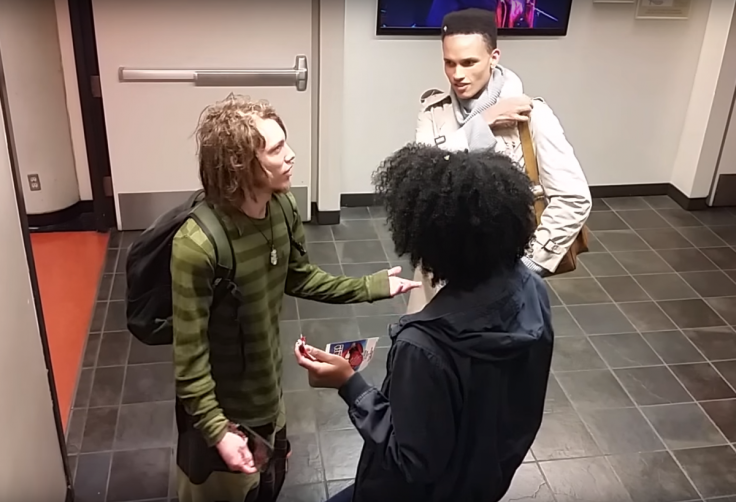Cultural appropriation: From dreadlocks to keffiyehs – don't mimic cultures you don't understand

Even before I acquired my grandmother's headscarves, I understood everything I needed to about aesthetics. I was not so much negotiating their embroidery to suit a skirt or style of shoe, but rather my nose — kinked in its middle, forever the Turkish look — and thick eyebrows. There were always jokes when my culture and my foreignness were emphasised like this.
How much did us brown kids want to show-off our style and be met with a similar wax-lyrical as Kendal Jenner when she shared media-worthy pictures outside an Abu Dhabi mosque dressed in abaya? But we all know that Muslim girls are not appreciated for their appearance, instead kept at suspicious arm's-length, then interrogated on how much of the look was even their own choosing.
Likewise, could a black man rap and drape his jeans low without being called a thief or drug dealer? Could a Palestinian man tie a keffiyeh around his neck without being stopped and frisked by airport security? To understand the preciousness of communities and their territory - the flair, the clothes, the hair - is to recognise the struggle which comes with looking that way.
When a white student at San Francisco State University, Cory Goldstein, fought back criticism from a black woman about his dreadlocks, he was thinking about himself, his rights, and nothing more.
"The fact that I have locks is not that I am trying to appropriate this culture," said Goldstein in an interview with Xpress News following the video footage going viral, "I think it shows I actually love and respect their culture and it is something that I hold true to myself." But his love and admiration is not a thing that matters.
There is no look within communities of colour that has not been used to either typecast or vilify. Black hairstyles, clothes and words come with a lifetime of disparity. To truly carry oneself as black would mean to become less employable, more arrestable, and less attractive to society. You can take those three factors and sprinkle them onto every community of colour in a world that functions within whiteness.
If Goldstein and his dreadlocks were being true, he would be living the life of a black man, including all the suspicion, state violence and holdbacks that come with it. "You're saying I can't have a hairstyle because of your culture. Why?" he asks. "Because it's my culture," she replies. Had he thought about it, he would have understood what she was saying — her culture comes with a responsibility to survive. His does not.
You'd have to understand the pain of being ridiculed for your heritage and skin colour first to believe why Goldstein is wrong. True, he can do whatever he likes with his own head. But just as people of colour negotiate the paths of struggle that lay ahead, whiteness has a responsibility to step back and let us get there.
Had he asked the woman why it was important for her to raise his hair as an issue, he might have learnt something about her pain, ahead of his perceived prerogatives. They could both be standing in front of the other with exactly the same hairstyle, yet neither would be living with the exact same opportunities.
You cannot dip into another person's heritage and hope that your love for it will be enough. Whether Goldstein likes it or not, his dreadlocks are a part of the same problem that offers Native American headdress at festivals and blackface at frat parties. It's taken long enough to see institutions such as the University of East Anglia to ban a Mexican restaurant from giving out sombreros to students in a marketing exercise that was widely off the mark.
They could both be standing in front of the other with exactly the same hairstyle, yet neither would be living with the exact same opportunities.
Careless stereotyping is not a celebration of anyone's culture. It's careless insensitivity at best and harmful at worst. If you belong to a group who has been punished in both your life and your ancestors' lives, seeing those very attributes copied that you have had to hide — or even worse, couldn't hide — is going to hurt.
"I felt that I didn't need to explain myself. It's my hair, my rules, my body." Yet, this is not a mantra afforded to those without whiteness. 'My hair, my rules, my body' is nowhere to be seen as a black man's afro is groped 'for its softness'. Nor as a Middle Eastern woman's hijab is torn from her in public or as a woman is asked to explain a deadly terrorist attack in another country because she is presumed to be Muslim.
Were this a sentence that meant anything to white supremacy, the hair of small child Blue Ivy may not have been the endless cause of ridicule and disapproval. And it is for this reason that Goldstein, and others like him, are asked to be mindful when declaring what it means to have bodily rights.
Chimene Suleyman is a writer from London based in New York. She writes a column on racial politics for Media Diversified, and recently released her debut poetry collection Outside Looking On. Follow her on Twitter @chimenesuleyman
© Copyright IBTimes 2025. All rights reserved.






















